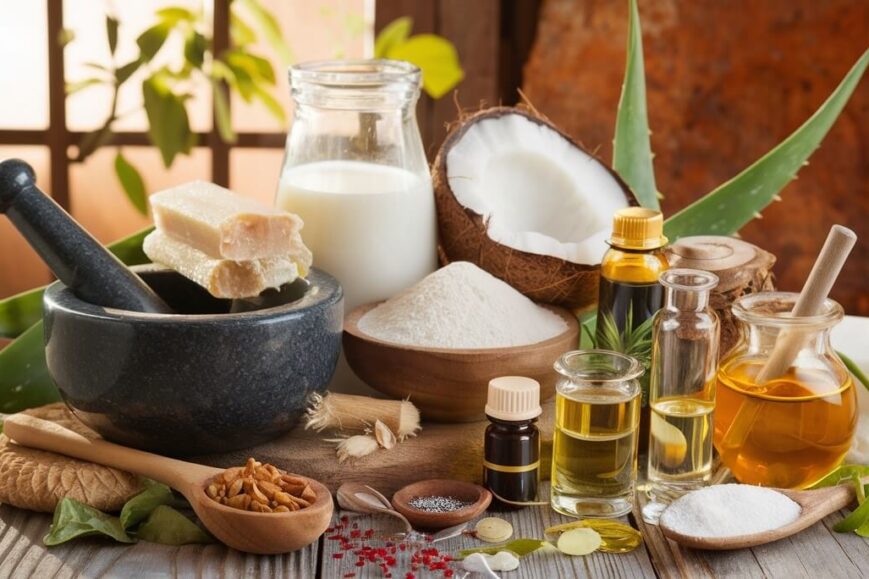Are you frustrated with using shampoos with unhealthy chemicals that make your hair dull and lifeless? Many individuals are returning to natural products and avoiding using commercial hair products. The need for organic and environmentally friendly hair care products is rising. Many individuals are realizing that synthetic substances have negative impacts on the hair, the scalp, and the earth.
But what if I told you that you could make your natural shampoo in your home? Guess what? It’s simpler than you may have thought. Making your Routine Shampoo is an excellent idea because you will expose your hair to chemicals and save money and the environment.
We will also let you know how to prepare a mild yet potent shampoo from easily obtained natural products. You are about to bid farewell to frizzy hair, dandruff, and lifeless hair. Your hair will be very grateful to you!
Why Use Natural Shampoo?

- Commercial shampoos often contain harmful chemicals: Sulfates and parabens are among the most popular offenders. Sulfates eliminate the natural moisture from your hair, thus causing it to become dry and irritated. Preservatives such as parabens have been known to disrupt hormones and cause other health concerns.
- Natural ingredients promote hair and scalp health: Natural shampoos contain mild and moisturizing substances, including aloe vera, coconut oil, and essential oils. These ingredients help moisturize and calm the hair and scalp, allowing for a healthy state without any adverse side effects.
- Environmental and ethical benefits: Natural shampoos are usually eco-friendly and, therefore, cause low pollution of the environment. Sometimes, they originate from sustainable sources and do not involve animal testing, which makes them better. Products derived from nature are healthier for the planet and promote humane animal treatment.
Essential Ingredients for Natural Shampoo
Here’s a list of critical ingredients commonly used in natural shampoos and their benefits:
These ingredients form the basis of the shampoo formulation, which is efficient and harmless in cleaning hair and scalp.
Step-by-Step Guide to Making Natural Shampoo
Castile Soap: 1 cup
Coconut Milk: 1 cup
Aloe Vera Gel 2 tablespoons
Essential Oils: 20-30 drops (choose based on hair needs, e.g., tea tree, lavender)
Carrier Oils: 1 tablespoon (e.g., jojoba or almond oil)
Mix Castile Soap and Coconut Milk:
Combine 1 cup of castile soap with 1 cup of coconut milk in a bowl.
Stir gently until well blended.
Choose and Add Essential Oils:
Select essential oils based on your hair needs (e.g., ten drops of tea tree oil for dandruff, ten drops of lavender oil for calming effects).
Add 20-30 drops of essential oils to the base mixture.
Stir gently to incorporate the oils evenly.
Mix All Ingredients:
Add two tablespoons of aloe vera gel and one tablespoon of carrier oil (e.g., jojoba or almond oil) to the mixture.
Stir well to ensure all components are thoroughly combined.
Pour the blend into a clean, empty shampoo bottle or dispenser.
Store Properly:
Store the shampoo in a cool, dark place.
Shake well before each use to ensure the ingredients are evenly mixed.
Wet your hair thoroughly.
Apply a small amount of the natural shampoo to your scalp and hair.
Massage gently, focusing on the scalp to stimulate circulation and cleanse thoroughly.
Rinse well with warm water.
Use 2-3 times a week or as needed for best results.
By following these steps, you can create a natural shampoo tailored to your hair’s needs. It will provide a gentle yet effective cleanse while nourishing and revitalizing your hair and scalp.
Your hair might take some time to adjust when switching from commercial to natural shampoo. Be patient and allow a few weeks for the transition.
Customizing Your Natural Shampoo
Tailor your natural shampoo to suit different hair types by adjusting the ingredients. Here are some suggestions:
| Hair Type | Ingredient Additions/Substitutions | Benefits |
|---|---|---|
| Oily Hair | Add lemon juice or witch hazel | Controls excess oil and balances the scalp |
| Dry Hair | Add extra coconut oil or honey | Provides extra moisture and nourishment |
| Curly Hair | Add argan oil or shea butter | Enhances curl definition and reduces frizz |
| Sensitive Scalp | Use chamomile tea or cucumber extract | Soothes irritation and reduces inflammation |
How to Tailor the Shampoo:
- For Oily Hair:
- For Dry Hair:
- For Curly Hair:
- For Sensitive Scalp:
When using natural shampoo, add these ingredients to match your hair needs and get the best out.
Customize your shampoo based on your hair type and needs. For example, add essential oils like tea tree for oily hair or lavender for dry hair.
Tips for Using Your Natural Homemade Shampoo

Now that you’ve created your natural shampoo, here are some tips to ensure you get the most out of it:
- Application and Lathering
- Adjusting Consistency
- Proper Storage
All hair is unique, so modifications to the ingredients and methods may be necessary depending on your hair type and concerns.
Always do a patch test with new ingredients to avoid allergic reactions or irritation.
Tips for Best Results
To get the most out of your natural shampoo, follow these tips:
- How Often to Use Natural Shampoo
- What to Expect During the Transition
- Additional Hair Care Tips
The above tips will help you improve your natural shampoo regimen and keep your hair healthy.
The Benefits of Using Natural Homemade Shampoo

The following highlights the benefits of using natural homemade shampoo instead of buying commercial hair products.
If you have been thinking of changing your hair product, you can opt for a natural homemade shampoo and realize these benefits simultaneously. Yes, it does. It’s a win-win situation for you and the planet!
Conclusion
Thanks to the increasing environmental awareness and personal health concerns in the modern world, choosing an organic homemade shampoo is a rational and rewarding decision.
When you make your natural shampoo at home, you will be able to enjoy a clean and nourishing experience without subjecting your hair and scalp to the chemicals inherent in most commercial shampoos. Components like coconut oil, aloe vera, and essential oil are all-natural and useful for the overall health of your hair and give the hair a silky, shiny, and smooth look.
In addition to making you look good, homemade shampoo is also more environmentally friendly. It is also important to consider that the products are natural and biodegradable, and the packaging used is reusable, while the conventional products on the supermarket shelves are synthetic and single-use.
Why not use natural products to make our shampoos next time? Try out new and unique mixtures, discover which components work best for your hair and scalp, and have a great time making a product that is helpful to you and eco-friendly. Use your stories and triumphs to educate others – you may encourage others to embrace the natural shampoo bandwagon.
FAQs
-
Can natural shampoo help with scalp conditions like dandruff?
Certain ingredients in natural shampoos, such as tea tree oil, can help treat scalp conditions like dandruff due to their antimicrobial properties.
-
Will natural shampoo lather like commercial shampoos?
Natural shampoos may lather less than commercial shampoos that contain sulfates. This is normal and doesn’t affect cleansing effectiveness.
-
Will natural shampoo help with hair growth?
While natural shampoos can promote healthier hair and scalp conditions, they do not directly stimulate hair growth. Consistent use of nourishing ingredients can support overall hair health.
-
Will switching to natural shampoo solve scalp irritation problems?
Natural shampoos, especially soothing ingredients like aloe vera or chamomile, can help alleviate scalp irritation caused by sensitivity or harsh chemical reactions.
-
Which homemade shampoo is best?
Basil leaves water and Aloe Vera gel: Boil a few neem leaves in a cup of water. Now, add 10-15 basil leaves in a blender and 2-3 tablespoons of aloe vera gel. Prepare a thick mixture and add some prepared neem water to it. Mix any good herbal shampoo in it and apply it to your hair.
-
Are natural shampoos really better?
Natural shampoos are free of the chemicals that are often found in regular shampoo – and for most people who use them, this means healthier, shinier hair. They’re free of things like parabens, a form of preservative that is known to cause sensitivity in some people.
-
Can natural shampoo be used by children or individuals with sensitive skin?
Natural shampoos are generally gentle and suitable for children and individuals with sensitive skin. Always conduct a patch test and choose mild formulations without harsh additives.

